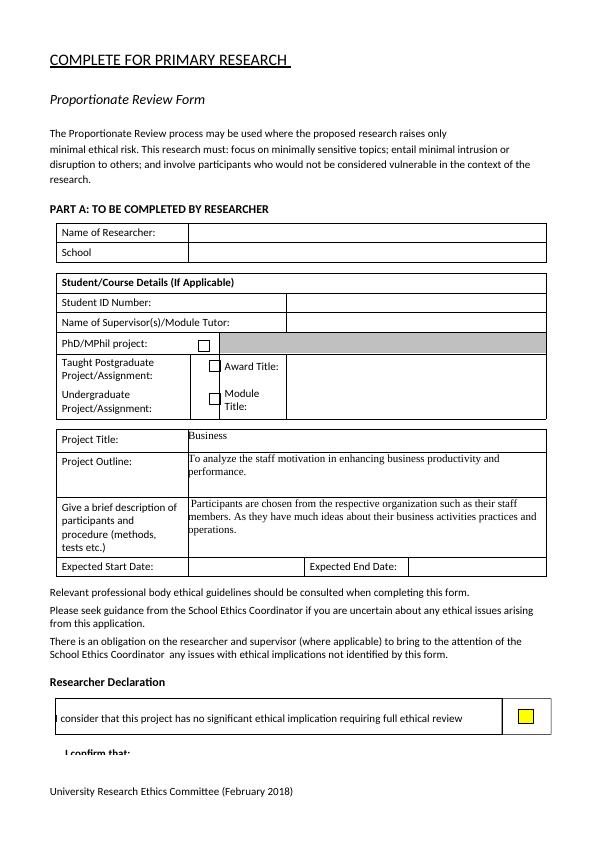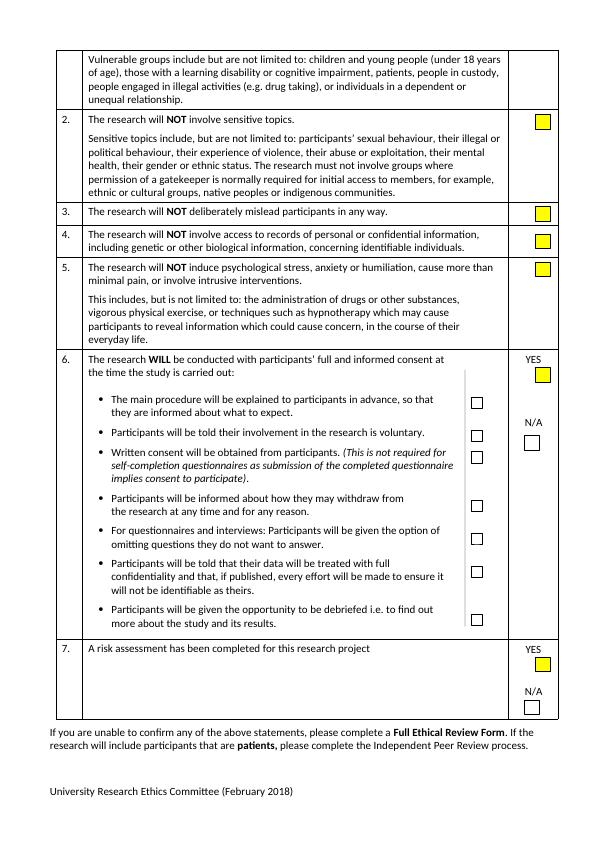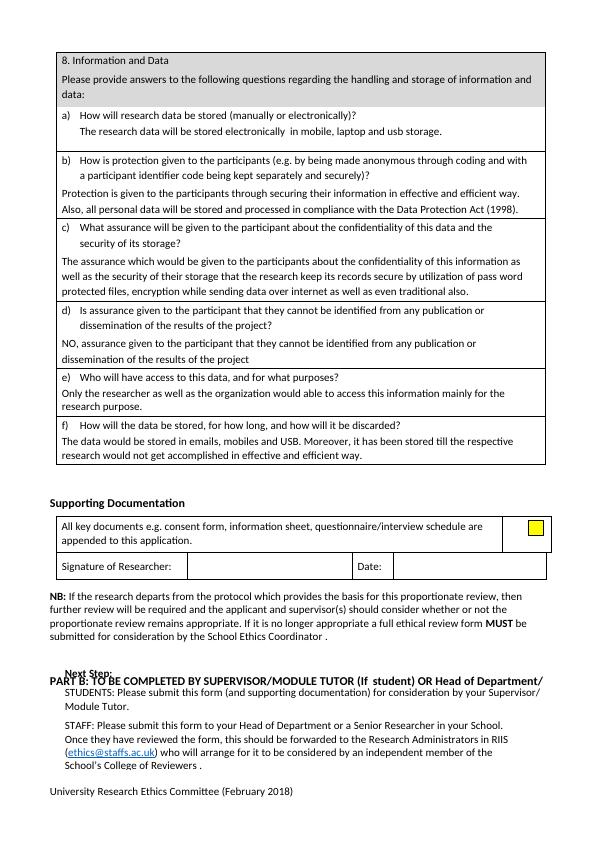Ethical Form for Primary and Secondary Research
Added on 2023-06-11
11 Pages2654 Words333 Views
University Research Ethics Committee (February 2018)
I confirm that:
I consider that this project has no significant ethical implication requiring full ethical review
COMPLETE FOR PRIMARY RESEARCH
Proportionate Review Form
The Proportionate Review process may be used where the proposed research raises only
minimal ethical risk. This research must: focus on minimally sensitive topics; entail minimal intrusion or
disruption to others; and involve participants who would not be considered vulnerable in the context of the
research.
PART A: TO BE COMPLETED BY RESEARCHER
Name of Researcher:
School
Student/Course Details (If Applicable)
Student ID Number:
Name of Supervisor(s)/Module Tutor:
PhD/MPhil project:
Taught Postgraduate
Project/Assignment: Award Title:
Module
Title:
Undergraduate
Project/Assignment:
Project Title: Business
Project Outline: To analyze the staff motivation in enhancing business productivity and
performance.
Give a brief description of
participants and
procedure (methods,
tests etc.)
Participants are chosen from the respective organization such as their staff
members. As they have much ideas about their business activities practices and
operations.
Expected Start Date: Expected End Date:
Relevant professional body ethical guidelines should be consulted when completing this form.
Please seek guidance from the School Ethics Coordinator if you are uncertain about any ethical issues arising
from this application.
There is an obligation on the researcher and supervisor (where applicable) to bring to the attention of the
School Ethics Coordinator any issues with ethical implications not identified by this form.
Researcher Declaration
I confirm that:
I consider that this project has no significant ethical implication requiring full ethical review
COMPLETE FOR PRIMARY RESEARCH
Proportionate Review Form
The Proportionate Review process may be used where the proposed research raises only
minimal ethical risk. This research must: focus on minimally sensitive topics; entail minimal intrusion or
disruption to others; and involve participants who would not be considered vulnerable in the context of the
research.
PART A: TO BE COMPLETED BY RESEARCHER
Name of Researcher:
School
Student/Course Details (If Applicable)
Student ID Number:
Name of Supervisor(s)/Module Tutor:
PhD/MPhil project:
Taught Postgraduate
Project/Assignment: Award Title:
Module
Title:
Undergraduate
Project/Assignment:
Project Title: Business
Project Outline: To analyze the staff motivation in enhancing business productivity and
performance.
Give a brief description of
participants and
procedure (methods,
tests etc.)
Participants are chosen from the respective organization such as their staff
members. As they have much ideas about their business activities practices and
operations.
Expected Start Date: Expected End Date:
Relevant professional body ethical guidelines should be consulted when completing this form.
Please seek guidance from the School Ethics Coordinator if you are uncertain about any ethical issues arising
from this application.
There is an obligation on the researcher and supervisor (where applicable) to bring to the attention of the
School Ethics Coordinator any issues with ethical implications not identified by this form.
Researcher Declaration

University Research Ethics Committee (February 2018)
1. The research will NOT involve members of vulnerable groups.
1. The research will NOT involve members of vulnerable groups.

University Research Ethics Committee (February 2018)
Vulnerable groups include but are not limited to: children and young people (under 18 years
of age), those with a learning disability or cognitive impairment, patients, people in custody,
people engaged in illegal activities (e.g. drug taking), or individuals in a dependent or
unequal relationship.
2. The research will NOT involve sensitive topics.
Sensitive topics include, but are not limited to: participants’ sexual behaviour, their illegal or
political behaviour, their experience of violence, their abuse or exploitation, their mental
health, their gender or ethnic status. The research must not involve groups where
permission of a gatekeeper is normally required for initial access to members, for example,
ethnic or cultural groups, native peoples or indigenous communities.
3. The research will NOT deliberately mislead participants in any way.
4. The research will NOT involve access to records of personal or confidential information,
including genetic or other biological information, concerning identifiable individuals.
5. The research will NOT induce psychological stress, anxiety or humiliation, cause more than
minimal pain, or involve intrusive interventions.
This includes, but is not limited to: the administration of drugs or other substances,
vigorous physical exercise, or techniques such as hypnotherapy which may cause
participants to reveal information which could cause concern, in the course of their
everyday life.
6. The research WILL be conducted with participants’ full and informed consent at
the time the study is carried out:
The main procedure will be explained to participants in advance, so that
they are informed about what to expect.
Participants will be told their involvement in the research is voluntary.
Written consent will be obtained from participants. (This is not required for
self-completion questionnaires as submission of the completed questionnaire
implies consent to participate).
Participants will be informed about how they may withdraw from
the research at any time and for any reason.
For questionnaires and interviews: Participants will be given the option of
omitting questions they do not want to answer.
Participants will be told that their data will be treated with full
confidentiality and that, if published, every effort will be made to ensure it
will not be identifiable as theirs.
Participants will be given the opportunity to be debriefed i.e. to find out
more about the study and its results.
YES
N/A
7. A risk assessment has been completed for this research project YES
N/A
If you are unable to confirm any of the above statements, please complete a Full Ethical Review Form. If the
research will include participants that are patients, please complete the Independent Peer Review process.
Vulnerable groups include but are not limited to: children and young people (under 18 years
of age), those with a learning disability or cognitive impairment, patients, people in custody,
people engaged in illegal activities (e.g. drug taking), or individuals in a dependent or
unequal relationship.
2. The research will NOT involve sensitive topics.
Sensitive topics include, but are not limited to: participants’ sexual behaviour, their illegal or
political behaviour, their experience of violence, their abuse or exploitation, their mental
health, their gender or ethnic status. The research must not involve groups where
permission of a gatekeeper is normally required for initial access to members, for example,
ethnic or cultural groups, native peoples or indigenous communities.
3. The research will NOT deliberately mislead participants in any way.
4. The research will NOT involve access to records of personal or confidential information,
including genetic or other biological information, concerning identifiable individuals.
5. The research will NOT induce psychological stress, anxiety or humiliation, cause more than
minimal pain, or involve intrusive interventions.
This includes, but is not limited to: the administration of drugs or other substances,
vigorous physical exercise, or techniques such as hypnotherapy which may cause
participants to reveal information which could cause concern, in the course of their
everyday life.
6. The research WILL be conducted with participants’ full and informed consent at
the time the study is carried out:
The main procedure will be explained to participants in advance, so that
they are informed about what to expect.
Participants will be told their involvement in the research is voluntary.
Written consent will be obtained from participants. (This is not required for
self-completion questionnaires as submission of the completed questionnaire
implies consent to participate).
Participants will be informed about how they may withdraw from
the research at any time and for any reason.
For questionnaires and interviews: Participants will be given the option of
omitting questions they do not want to answer.
Participants will be told that their data will be treated with full
confidentiality and that, if published, every effort will be made to ensure it
will not be identifiable as theirs.
Participants will be given the opportunity to be debriefed i.e. to find out
more about the study and its results.
YES
N/A
7. A risk assessment has been completed for this research project YES
N/A
If you are unable to confirm any of the above statements, please complete a Full Ethical Review Form. If the
research will include participants that are patients, please complete the Independent Peer Review process.

Next Step:
STUDENTS: Please submit this form (and supporting documentation) for consideration by your Supervisor/
Module Tutor.
STAFF: Please submit this form to your Head of Department or a Senior Researcher in your School.
Once they have reviewed the form, this should be forwarded to the Research Administrators in RIIS
(ethics@staffs.ac.uk) who will arrange for it to be considered by an independent member of the
School’s College of Reviewers .
University Research Ethics Committee (February 2018)
8. Information and Data
Please provide answers to the following questions regarding the handling and storage of information and
data:
a) How will research data be stored (manually or electronically)?
The research data will be stored electronically in mobile, laptop and usb storage.
b) How is protection given to the participants (e.g. by being made anonymous through coding and with
a participant identifier code being kept separately and securely)?
Protection is given to the participants through securing their information in effective and efficient way.
Also, all personal data will be stored and processed in compliance with the Data Protection Act (1998).
c) What assurance will be given to the participant about the confidentiality of this data and the
security of its storage?
The assurance which would be given to the participants about the confidentiality of this information as
well as the security of their storage that the research keep its records secure by utilization of pass word
protected files, encryption while sending data over internet as well as even traditional also.
d) Is assurance given to the participant that they cannot be identified from any publication or
dissemination of the results of the project?
NO, assurance given to the participant that they cannot be identified from any publication or
dissemination of the results of the project
e) Who will have access to this data, and for what purposes?
Only the researcher as well as the organization would able to access this information mainly for the
research purpose.
f) How will the data be stored, for how long, and how will it be discarded?
The data would be stored in emails, mobiles and USB. Moreover, it has been stored till the respective
research would not get accomplished in effective and efficient way.
Supporting Documentation
All key documents e.g. consent form, information sheet, questionnaire/interview schedule are
appended to this application.
Signature of Researcher: Date:
NB: If the research departs from the protocol which provides the basis for this proportionate review, then
further review will be required and the applicant and supervisor(s) should consider whether or not the
proportionate review remains appropriate. If it is no longer appropriate a full ethical review form MUST be
submitted for consideration by the School Ethics Coordinator .
PART B: TO BE COMPLETED BY SUPERVISOR/MODULE TUTOR (If student) OR Head of Department/
STUDENTS: Please submit this form (and supporting documentation) for consideration by your Supervisor/
Module Tutor.
STAFF: Please submit this form to your Head of Department or a Senior Researcher in your School.
Once they have reviewed the form, this should be forwarded to the Research Administrators in RIIS
(ethics@staffs.ac.uk) who will arrange for it to be considered by an independent member of the
School’s College of Reviewers .
University Research Ethics Committee (February 2018)
8. Information and Data
Please provide answers to the following questions regarding the handling and storage of information and
data:
a) How will research data be stored (manually or electronically)?
The research data will be stored electronically in mobile, laptop and usb storage.
b) How is protection given to the participants (e.g. by being made anonymous through coding and with
a participant identifier code being kept separately and securely)?
Protection is given to the participants through securing their information in effective and efficient way.
Also, all personal data will be stored and processed in compliance with the Data Protection Act (1998).
c) What assurance will be given to the participant about the confidentiality of this data and the
security of its storage?
The assurance which would be given to the participants about the confidentiality of this information as
well as the security of their storage that the research keep its records secure by utilization of pass word
protected files, encryption while sending data over internet as well as even traditional also.
d) Is assurance given to the participant that they cannot be identified from any publication or
dissemination of the results of the project?
NO, assurance given to the participant that they cannot be identified from any publication or
dissemination of the results of the project
e) Who will have access to this data, and for what purposes?
Only the researcher as well as the organization would able to access this information mainly for the
research purpose.
f) How will the data be stored, for how long, and how will it be discarded?
The data would be stored in emails, mobiles and USB. Moreover, it has been stored till the respective
research would not get accomplished in effective and efficient way.
Supporting Documentation
All key documents e.g. consent form, information sheet, questionnaire/interview schedule are
appended to this application.
Signature of Researcher: Date:
NB: If the research departs from the protocol which provides the basis for this proportionate review, then
further review will be required and the applicant and supervisor(s) should consider whether or not the
proportionate review remains appropriate. If it is no longer appropriate a full ethical review form MUST be
submitted for consideration by the School Ethics Coordinator .
PART B: TO BE COMPLETED BY SUPERVISOR/MODULE TUTOR (If student) OR Head of Department/

End of preview
Want to access all the pages? Upload your documents or become a member.
Related Documents
Proportionate Review Form for Primary Research - Deskliblg...
|15
|2544
|298
Impact of Digital Marketing on Productivity of a Firm: A Study on ThirdWay Grouplg...
|9
|2917
|491
Research Ethics for Digital Marketing Tools Influencing Buying Decisions of Customers in Retail Industrylg...
|4
|1547
|194
Impact of Reward Systems on Employee Satisfaction in UK Retail Industry: A Study on Morrisonlg...
|11
|2649
|462
Impact of Training and Development on Employee Performance and Profitability: A Study on Hilton in UKlg...
|28
|2305
|265
Research Ethics Checklist Assignment Samplelg...
|4
|1108
|43
